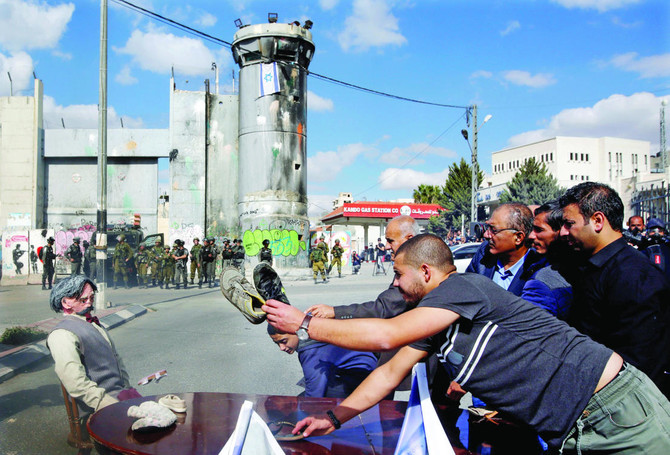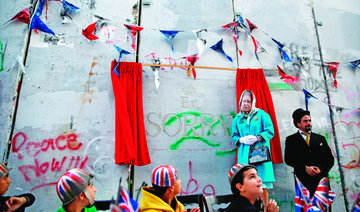LONDON: The UK government’s continued refusal to apologize for the 1917 Balfour Declaration has been criticized by those who see the document as being at the root of today’s Israeli-Palestinian conflict.
The growing demand for an apology is accompanied by pleas for a critical review of the UK’s foreign policy and its responsibilities toward the Palestinians.
“An apology is an important symbolic act,” said Prof. Ilan Pappé, director of the European Centre for Palestine Studies at the University of Exeter. “But it should be accompanied by a sense of accountability, hence what I suggest is that a change of British current policy on Palestine is the best way to atone for the Balfour Declaration,” he said.
Today marks the centenary of the date of the controversial document. It was signed in 1917 by then-Foreign Secretary Arthur Balfour, who expressed his support for the creation of a “national home” for the Jewish people in Palestine and set in motion a series of events resulting in the creation of Israel in 1948.
The document also pledged that the “civil and religious rights” of existing non-Jewish communities in Palestine would not be prejudiced, a promise that many argue the UK has broken, and for which the Palestinian people are now owed an apology.
“For decades one of the biggest grievances the Palestinians have is that there has been no recognition that they have been dealt an injustice,” said Karl Sabbagh, a Palestinian writer and documentary producer.
“Regardless of whether this injustice is rectified or not, it is a slap in the face to be told, effectively, ‘you have no grounds for complaint’,” he said.
The UK-based campaigning group, the Palestinian Return Centre, relaunched its Balfour Apology Campaign on Oct. 25, demanding that the UK government acknowledge its responsibility in the current divide between Israelis and Palestinians. The campaign is running a petition to demand an official apology from the government.
The UK has so far rejected calls for an apology, initially issuing an official statement in April that was followed by Prime Minister Theresa May’s address to Parliament in late October, in which she said the government would “certainly mark the centenary with pride.”
Foreign Secretary Boris Johnson wrote in his Daily Telegraph column on Oct. 29 that the declaration was “indispensable to the creation of a great nation,” adding that the document fulfilled an “incontestable moral goal” and provided a “persecuted people with a safe and secure homeland.”
Johnson did go on to acknowledge that the caveat to safeguard the interests of the Palestinians “has not been fully realized.” He backed the concept of a two-state solution to the Israeli-Palestinian conflict, with the borders based on the lines as they were before the 1967 war.
May will be marking the anniversary with a celebratory dinner with her Israeli counterpart Benjamin Netanyahu and a select group of MPs, a move that has angered many who see Israel’s current expansionary policies and settlements in the West Bank as infringing on the rights and wellbeing of the Palestinian people.
There are other celebrations taking place in the UK, including an event organized by Balfour 100 bringing Christians and Jews together at the Royal Albert Hall in London for an evening of music and dance.
“There is also a very active lobbying effort in support of Israel, which has promoted the Balfour centenary as a time to celebrate the British-Israeli relationship rather than to take a critical view of the legacy of the declaration,” said Adam Sutcliffe, reader of history at King’s College London. Sutcliffe is also a member of the Independent Jewish Voices steering committee, which has recently produced a film called “100 Years After Balfour,” which examines the politician’s legacy.
“The UK government has, it seems, been persuaded that many British Jews would be very unhappy if they did not support this celebration,” he said.
Many are unhappy about the idea of “celebrating” the declaration, and rather call for the government to use the centenary as a chance to learn from the past.
“It is not an anniversary to celebrate,” said John Bond, spokesperson for the Balfour Project, a UK-based organization which aims to educate the government about the legacy of the declaration.
“It is a time to look afresh at the declaration and its outcomes,” he said. “We will continue working for an apology from our government. An apology is not just words. It must include a commitment to help improve the conditions in which many Palestinian people live, and to work for a just political settlement,” he said.
It is important that efforts to secure an apology are not misinterpreted as a way of questioning Israel’s right to exist, said Miranda Pinch, an activist and producer of a new documentary on the legacy of Balfour.
“I think that what is sought is an acknowledgment of accountability and failure on the part of the UK government, rather than an apology as such,” she said. “The problem with an apology is that it can be seen as a regret about the creation of Israel and, at this stage, I don’t think that would be helpful for anyone.”
She added that the UK government has failed “to hold Israel accountable in any meaningful way for its continued human rights violations, illegal occupation and land theft of what was left of historic Palestine.”
Sutcliffe added: “I’m not sure how helpful an official British apology would be; once the UK government starts to apologize for its colonial past, there would be many other apologies to make also.
“However, the UK government should certainly not be celebrating the Balfour Declaration. It should be encouraging a nuanced and critical approach, focusing attention on the negative impact of the declaration on Palestinians, who continue to suffer and to be denied basic justice and human rights, whether in the occupied West Bank, effectively still blockaded in Gaza, or in refugee camps elsewhere.”
UK’s refusal to apologize for Balfour draws criticism
UK’s refusal to apologize for Balfour draws criticism

Palestinian president receives draft of constitution ahead of elections

- Local elections scheduled for April, Palestinian National Council elections in November
- Draft constitution maintains political pluralism, separation of powers, while also allowing parliament to carry out oversight, legislative responsibilities
LONDON: Palestinian President Mahmoud Abbas has received a draft of the provisional constitution as the Palestinian Authority prepares to conduct elections this year.
Abbas said on Thursday that the drafting of the provisional Palestinian constitution would pave the way for the transition from the current Palestinian Authority to a fully fledged state, which to date about 160 countries have recognized.
Palestinian local elections are scheduled for April, while the Palestinian National Council elections are to take place in November, according to a decree issued by Abbas last week. The latter are for the Palestine Liberation Organization’s parliament and it will be the first time members are elected by direct popular vote, rather than appointed or co-opted.
Counselor Muhammad Al-Hajj Qasim led the drafting committee, which worked for about seven months and held 70 meetings. It consulted various civil society organizations and relevant stakeholders, according to the WAFA News Agency.
Qasim said the draft constitution maintained political pluralism and the separation of powers, while allowing parliament to carry out its oversight and legislative responsibilities. A copy of the draft will be submitted to the PLO’s Executive Committee.
The last national election for Palestinians was in 2006 but they voted for local representatives in 2021.
The Palestinian Legislative Council has not convened since 2007. Abbas dissolved the parliament in 2018 after it had remained inactive for over a decade, largely due to a rift between Fatah and Hamas, and the arrest of several MPs, primarily from Hamas, by the Israeli authorities.














